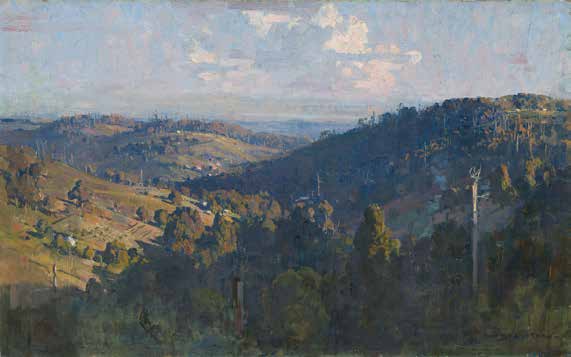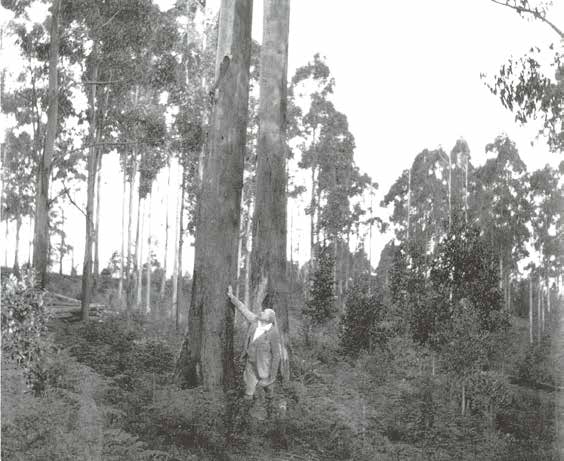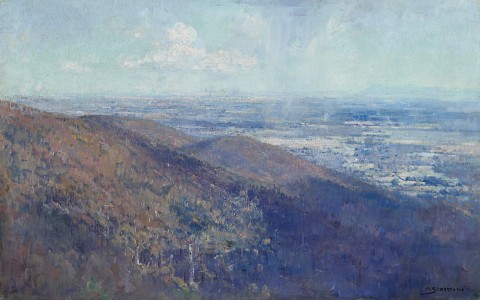MELBOURNE FROM SASSAFRAS, 1921
ARTHUR STREETON
oil on canvas
64.0 x 101.0 cm
signed lower right: A STREETON
Mr Norman Bayles, Melbourne
Leonard Joel, Melbourne, 2 November 1983, lot 40 (as 'Rain Burst over the Dandenongs')
Lister Gallery, Perth
Company Collection, Perth
Sotheby's, Sydney, 8 May 2012, lot 33
Private collection, Melbourne
Deutscher and Hackett, Melbourne, 6 May 2015, lot 43
Private collection, Melbourne
Arthur Streeton, Victorian Artists' Society Galleries, Melbourne, 5 – 6 July 1921
Recent Australian Landscape by Arthur Streeton, Education Department, Sydney, 21 – 28 November 1921, cat. 2
‘Art Notes. Paintings by Mr A. Streeton’, The Age, Melbourne, 6 July 1921, p. 11
‘Mr Streeton’s Pictures’, The Argus, Melbourne, 6 July 1921, p. 13
Colquhoun, A., ‘Arthur Streeton’s Art’, The Herald, Melbourne, 6 July 1921, p. 9
‘Arthur Streeton. A Farewell Exhibition’, The Sydney Morning Herald, Sydney, 22 November 1921, p. 11
Streeton, A., The Arthur Streeton Catalogue, Melbourne, 1935, cat. 731 (as 'Melbourne, from Sassafras', 1920)
Q STREETON.jpg

After living in London for more than a decade, Arthur Streeton returned to Australia with his wife and young son for an extended visit in 1920. The following year, he purchased five acres of land at Olinda in the Dandenong Ranges east of Melbourne, fulfilling a long-held ambition to establish what he once described as his own ‘pastoral treasury’. Following the sale of Golden Summer, Eaglemont, 1889 (National Gallery of Australia) for the extraordinary sum of 1000 guineas, he built a house there several years later and enthusiastically began to develop a garden against the backdrop of mature native blackwoods and gum trees. Writing to Tom Roberts in 1924, he enthused, ‘And the garden and the trees, what a delight it is. All through the winter I’ve put in my week-ends up there… working at the bramble and bracken… and planting no end of trees… blackwoods… Lambertiana Cypress… Acacia Elata’.1
Typically spending summers at Olinda, as well as making regular visits throughout the year, Streeton came to know the area well, and both his garden and the surrounding landscape feature in paintings produced during the 1920s and 30s. Continuing the practice established in his youth, of painting outdoors and working directly from the subject – as well as in the studio – Streeton captured the essence and the actuality of the landscape, skilfully combining fleeting atmospheric effects with recognisable geographical features. At the time, his paintings were seen as symbols of Australian life and land, and today, Streeton is still widely acknowledged as the creator of quintessentially national images. His status as one of the country’s most celebrated painters was marked in 1931 with a retrospective exhibition at the National Art Gallery of New South Wales. Displaying more than 170 works of art, it was at the time, the largest such exhibition ever presented by that institution.2 Writing that same year, Harold Herbert noted that, ‘His unfailing sureness is a source of wonder. His unerring vision and sense of colour and atmosphere in Australian landscape are unique. His work vibrates with realism’.3 While many works of this time reflect Streeton’s familiarity with the region and his ability to capture the beauty of the landscape in paint, his strong belief in the importance of protecting the natural environment also emerged as a significant theme during these years, motivated in part by the transformation he witnessed as a result of active logging and clearing.
1 STREETON 2.jpg

Located close to the highest peak of Mount Dandenong and just a short distance from Olinda, the township of Sassafras is named after a native evergreen tree which grows in the area’s cool temperate conditions. Streeton painted there on several occasions during 1921, and in Melbourne from Sassafras, 1921, he presents a monumental panoramic view. From a high vantage point, the scene looks out across densely treed hills in the foreground, opening up to a broad expanse of flat, partially cleared land that extends towards the distant city beyond. From his earliest painted impressions, such as those included in the famous 9x5 Impression Exhibition in 1889, to images of Sydney Harbour and classic ‘blue and gold’ pastoral landscapes, Streeton’s ability to convincingly depict light and atmosphere was a distinctive skill often commented upon by critics: ‘It all appears to be so simple – a daub of paint here and another of different colour there… A master of his medium, he gives us everything else… The great thing is the lasting impression of a landscape filled with light’.4
Streeton’s mastery is on full display here, the foreground hills resembling a patchwork of deep shadow contrasting with illuminated areas, the white trunks of tall trees glistening in the light. The cloudy, pale blue sky is marked by soft vertical brushstrokes which describe a shower of rain just right of centre, and highlight Streeton’s direct observation of the subject. Exhibited both in Melbourne and Sydney in 1921, the painting drew appreciative comment from contemporary critics, one of whom wrote that ‘the Victorian metropolis is… little more than suggested, [but] the interest [arises] from the poetry of the treatment… Melbourne from Sassafras, affords a nearer glimpse [of the city], but the interest is chiefly due to the clever handling of the sky from which showers of rain over the level field break the light. The technical difficulty of suggesting the myriad of trees massed on the rising steep in the foreground has been overcome with a sombre effect which contrasts with the animation of the scene below.’5
1. Streeton to Tom Roberts, 13 August 1924, quoted in Croll, R. H., Smike to Bulldog: Letters from Sir Arthur Streeton to Tom Roberts, Ure Smith Pty Ltd, Sydney, 1946, p. 119
2. Tunnicliffe, W., ‘The Big Picture: National Landscapes’ in Tunnicliffe, W. (ed.), Streeton, Art Gallery of New South Wales, Sydney, 2020, p.265
3. Herbert, H., ‘Art of Arthur Streeton, Sunlit Landscapes, Beautiful Flower Pieces’, Argus, 17 March 1931, p. 8 quoted in Eagle, M., The Oil Paintings of Arthur Streeton in the National Gallery of Australia, National Gallery of Australia, Canberra, 1994, p. 154
4. Ibid.
5. Sydney Morning Herald, Sydney, 22 November 1921, p. 11
KIRSTY GRANT
